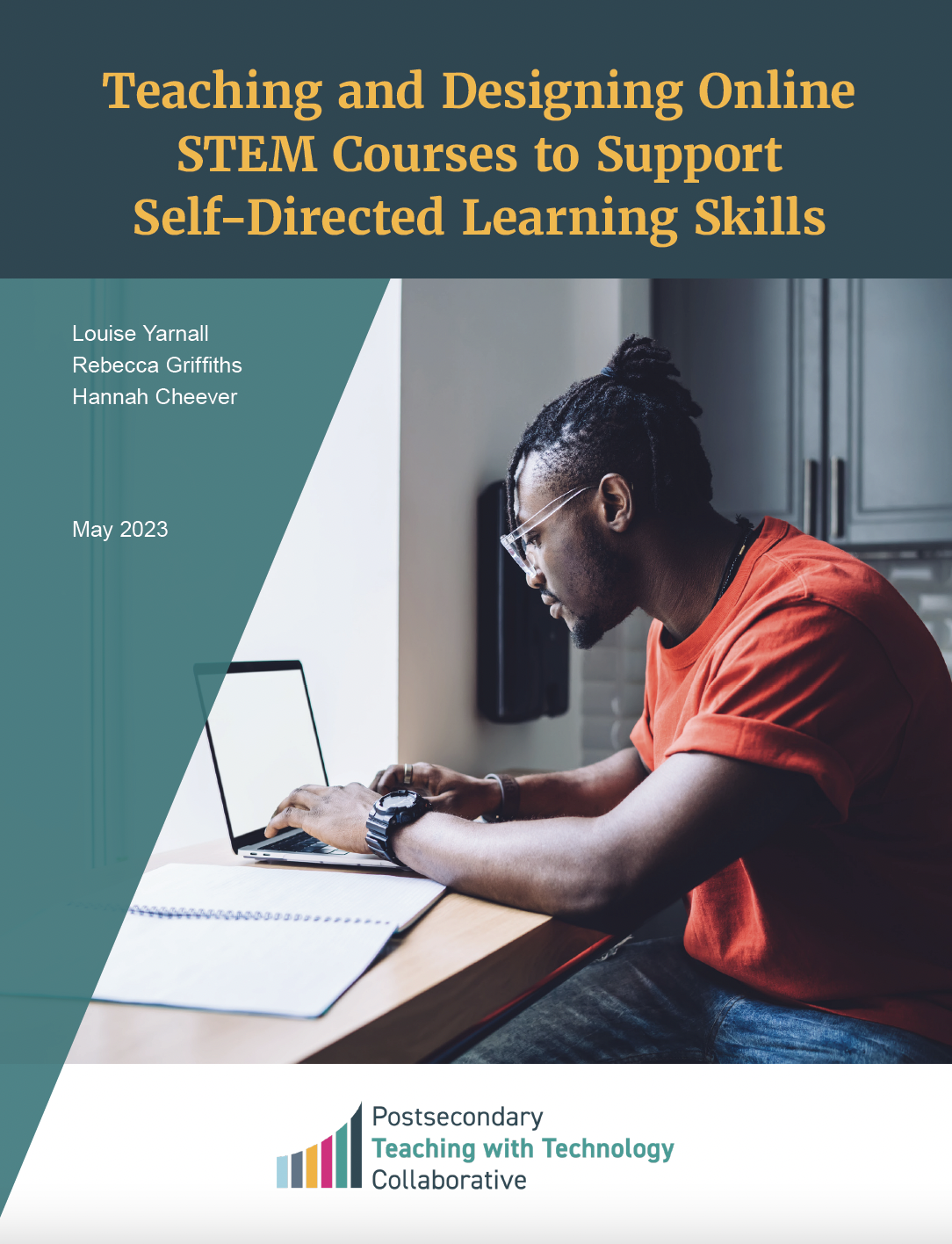May 25, 2023 | By Louise Yarnall and Hannah Cheever
The COVID-19 pandemic showed that online learning is here to stay, but it also revealed knowledge gaps around how to support all students to learn effectively online. As a result, educators are now highly motivated to develop new models for online teaching and learning that build students’ skills and motivation to learn.
Research indicates that students—particularly those in science, technology, engineering, and mathematics, or STEM, courses—benefit from using a collection of skills and mindsets to manage their own learning. The Postsecondary Collaborative calls these self-directed learning skills. We define these as motivation, metacognition, and applied learning skills that function as mutually reinforcing processes that enhance students’ capacity for active learning.
Given the potential of self-directed learning skills, the Collaborative seeks to study what happens when online STEM faculty incorporate instructional strategies to help their students put these processes into practice to manage their learning. This research aims to build on the lessons of the pandemic and deepen understanding of how colleges can support students in online STEM courses.
In a foundational report to inform our research, Teaching and Designing Online STEM Courses to Support Self-Directed Learning Skills, the Collaborative distills findings from an extensive literature review to explain what self-directed learning processes are, why they are important for student success, and how faculty can embed targeted instructional strategies into their online courses to help students.
In this blog post, we share some key findings from the report.
Focused interventions can enhance students’ grades, learning, and use of self-directed learning skills.
Research indicates that when faculty used instructional strategies to support self-directed learning, college STEM students showed significantly improved academic outcomes, such as course grades and completion. Such instructional supports also showed significant positive impacts on students’ capacity to apply the following mindsets and skills.
| Self-directed learning process | Mindset/skill |
|---|---|
| Motivational |
|
| Metacognitive |
|
| Applied learning |
|
Faculty can support students to manage their online learning.
Research has identified several instructional strategies that faculty can use to build self-directed learning mindsets and skills. Many of the example strategies below are relatively easy to incorporate into online classes.
| Self-directed learning process | Example Strategy |
|---|---|
| Motivational | Use video-based or written testimonials created by previous students with similar backgrounds about their personal journeys |
| Metacognitive | Ask students to complete a plan at the beginning of a course or project, which they can either upload or complete as an online form |
| Applied learning | Integrate support for seeking help—such as online sessions with peer tutors—within a learning management system |
Supporting self-directed learning skills helps to address problems of inclusivity and equity in online STEM courses.
More equitable approaches to online teaching and learning are necessary in STEM courses, given chronically disappointing success rates. STEM education reformers have advocated several strategies to make systems and policies more equitable, including increasing mentorship, embedding supports to counter stereotype threat and increase sense of belonging, and using instructional methods to promote more active learning. But online teaching can counter these reforms and exacerbate feelings of isolation and exclusion. Research shows the potential of strategies in online courses to mitigate these challenges with online learning, including the motivational strategy in the previous table. However, research is still limited with students in broad access institutions, like our partners.
To expand on past research, the Collaborative is applying these ideas to broad access colleges and online instruction.
Existing literature leaves open questions about how to design and deliver self-directed learning strategies and measure their impacts in online STEM courses in broad-access postsecondary institutions. While some studies report differential impacts on different groups of students, the strategies are rarely grounded in culturally responsive and sustaining instructional practices.
The Collaborative seeks to build on past research and practice by designing and testing online instructional strategies inspired by the research findings in our report. We envision that STEM faculty can use these strategies to build a more supportive online learning experience for their students.
